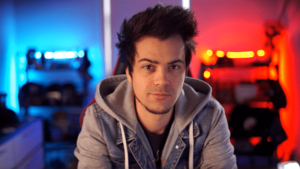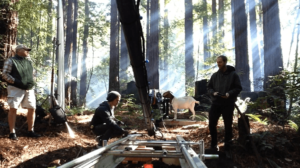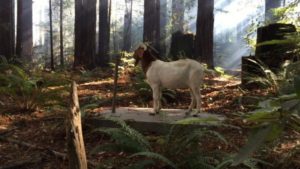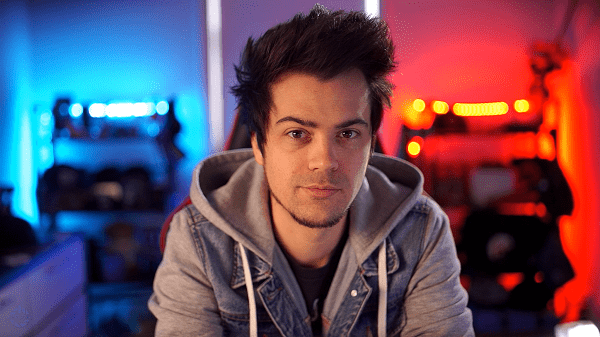Ian Degner is a film cameraman of some renown having worked on blockbusters like Jurassic World and Godzilla. He is known on Twitch as Activater and has over thirty thousand followers. By utilising specialist equipment and combining his love for films and gaming into his live streams Ian has remained a Twitch trailblazer. Recently he took time out to tell Martin Carr how he got there…

What made you want to transition from filmmaking into live streaming?
Film was something I’ve always done. I was working on every job I could, trying to gain as much experience as possible. As a freelancer in the industry, one would know that your jobs come by who you know and who knows you; word of mouth. However, there were days I just didn’t have anything booked. Naturally I would use this time to catch up on movies and play video games while passing the time away waiting until the next job on set. While doing these things, I found an application called “Twitch” on my gaming console that was showing off people playing games that I was interested in buying. It was Twitch that showed me my first ever broadcaster playing a game while commentating over it. I thought it was such a rad experience! It was later that I found myself watching Twitch on my off days, and more specifically watching a broadcaster by the name of Lirik; a variety broadcaster with a funny personality. It was after a few months of this, that I started to think about what it would be like to entertain others like he did for me. It was at that moment I decided that I would begin the process of creating my own Twitch channel. I wanted to share my gaming experiences while entertaining to the best of my ability.
What made you settle on Activater as a name for Twitch?
Coming up with an alias for myself was tough. I wanted something easy to remember as well as something that wasn’t hard to look at and read. Names on the internet are hard to secure and I had to dig deep when trying to figure out a name that would best suit me. At the time of creating my channel, I was listening to one of my favourite bands at the time, Family Force 5. This band consisted of three brothers and two of their friends. The lead vocal artist Solomon Olds was my favourite aspect of that band and his alias stuck with me, “Soul Glow Activatur“. It was from there that I tried to secure the name “Soul Glow” but every aspect of it was taken in some form on Twitch’s username availability. It was then that I tried to obtain “Activator” with the correct spelling and found it also taken, which led me to trying “Activater“. Once I figured out that was available, I tried to lock it in and I got it. It’s a name that I feel is easy to say and remember. The only thing that bugged me was the spelling, which was exacerbated by my early viewers making fun of the wrong spelling. I have since grown to love the name and some of my close viewers even started calling me “Acti” (pronounced like: Ack-Tee).

What key piece of advice would you give to a Twitch novice starting out?
Funny you should as — I just made a complete video all about my top ten tips for broadcasters starting out on the platform which can be found on my YouTube channel (YouTube.com/Activater). In this video I cover what I honestly think is most important from starting out, to veteran broadcasters. If I had to choose one piece of advice to give to someone, it would have to be that Twitch should NOT be the only source of content you put out there. Twitch today isn’t what it was when I started out. Today, you need to have a social media presence everywhere you can. Tik-Tok, Instagram, Twitter, etc. All these social media platforms can be filled with your content and really unlock a gateway for people to come check you out live. I strongly think that you need to produce content in multiple areas to grow on Twitch‘s platform.
What do you believe makes your live stream unique from other users?
When I started, I really didn’t know what was going to make me stand out. I don’t even think I had thought of that when I was creating my channel. After about a year of trying to gain partnership status on Twitch, I finally figured out what it was that people loved from me: the work I did in the film industry. It was this huge achievement when I realised I could combine my stream with my work and my knowledge from working as a cinematographer and camera assistant. It was then that I decided to make my channel the most cinematic camera experience I could give a viewer. I adopted a 4K cinema-like camera with a cinema lens to really showcase that streams can have something more than a simple webcam from your local computer store. I strive to have the best looking channel on the platform. From cameras, to lighting, to high end computer gear, I strive to give my viewers the best possible image almost as if they were looking at the silver screen itself. I’m always trying to push the envelope while helping others adopt better lighting and video for their own channels. About two years ago in the beginning of 2018, I pushed that envelope again by introducing the first constant moving camera on Twitch. A camera system that I used on set that allowed me to set my camera on a slider that would not only slide left and right, but pan as well to always have me in the centre of the frame. I’m always looking for ways of pushing quality on Twitch and will continue to innovate when I can.
To what extent has your experience in film helped in establishing an identity on the platform?
My work as a cinematographer and camera assistant gave me huge success on Twitch from a new viewers’ perspective. Not only am I known for my cinematic quality, but I’m also known as the guy who worked on Jurassic World. The guy who worked on Godzilla. The guy who brought his decade+ experience working on movies to a streaming platform. There’s always an exciting shock when I’m able to tell a new viewer that ‘yes, I worked on Jurassic World and here is some behind the scenes’. I have some behind the scenes that I love to share. It was this scene in a forest showing a goat about to be used as food for a hungry T-Rex while a group of visitors watched. I got to help film that goat along with a few other scenes.

Emotes are a unique means of communication on Twitch, what’s your approach to both creating and incorporating them into the channel?
Emotes today are a bit different than when I first started. Twitch and other streaming platforms are all about memes these days with new emotes being brought to the spotlight based on something that has happened. My personal channel emotes have all been created much the same way but with more of a personal touch to specifically my stream. My viewers know I’m a doofus at times and I love to have emotes that represent that. I have various emotes depicting certain things that have happened to me while streaming. For example, I have an emote of me on fire when I accidentally set myself ablaze with a Molotov while in a professional tournament for a game called PlayerUnknowns Battlegrounds. I have another of myself looking confused reading a book that’s upside down, due to the amount of times I have struggled reading long paragraphs in various games. Another favourite is a backpack with two hands coming out the top of it, representing the amount of times I get carried when I play a game with friends. Bringing emotes that represent your channel is crucial in my opinion but you also need to be up to date with the times. Emotes are always changing and should always evolve to give viewers something fresh to play with in chat.
In the past you have talked about balancing film assignments alongside Twitch commitments, what challenges have you faced managing both creative outlets?
Streaming used to always take a back seat when it came to my work in film. I never thought Twitch would become an actual source of income and so I would always put the stream on hold to work on a given job on set. However, I’ve always had a schedule so if I did in fact have to miss a day of streaming, I was nervous as I didn’t want to be away from the stream for too long. The thought of my viewers leaving my channel for not being there always gave me anxiety. Taking time off while streaming feels like an eternity on Twitch for a viewer. Missing a week feels like missing a month when you’re normally listening or watching for hours a day at a time throughout the week. On top of that, I was in a relationship that led to a marriage and I wanted to give my wife all the attention she deserved without her feeling like I was always filming inside our apartment. Finding a balance like working for a half day and then coming home to stream for a few hours, before she would get home, was always a challenge. With all that said, today I have made Twitch my primary focus for my income. It’s a dream job that I get to do every day. My wife even supports me on the live streams when she’s not working. Ever since we moved to Brooklyn, New York, I have made streaming my full time job while still taking film jobs when/if I’m called upon. That’s actually been the biggest struggle for balancing my stream and working on films; moving from one coast to the other. It was tough getting work as here on the east coast, my name hasn’t been established. The film industry is all about who you know and who knows you. It takes time to establish yourself in a new city without stepping on anyone’s toes. It’s a balance that I have yet to work out but for now, Twitch is my main job.
You incorporate facial tracking rigs and technical tutorials into your live streams alongside gaming, how has this broadened the audience base?
This has by far been the best for my channel. It’s one thing to be a normal streamer that plays games but it’s huge once you figure out what your audience is after. For me, my deep understanding of lighting, cameras, and gear has always been a staple that has led to people asking me questions all the time. I love that I have been able to take my knowledge from an entirely different career and put it into my current career. Bringing this knowledge from commercials, movies, music videos and more has really grown my audience base as most people on the platform, both as a viewer and broadcaster, have no real idea of the ins and outs of film. The times I get to see new viewers who come in and say something along the lines of, “this is by far the cleanest, high quality stream I’ve ever seen” really puts a smile on my face.

As and when the film industry starts up again, what do you think are the key considerations that should be addressed coming out of lockdown?
Coming out of this lock down for me is going to be a huge relief, as well as make me a nervous wreck. I’m 90% sure I had COVID-19 and I try as much as humanly possible to avoid spreading what I once had. This leads me to feeling nervous about getting back on set. I have no idea how this virus works even after I’ve been exposed and treated. I would never want to infect someone else and I’m strongly considering not going back until I know for sure there is some sort of cure in place where I can feel confident in me not spreading anything. I believe for those that go back to work on set need to take extreme caution. I know we’re all dying to get back in touch with what was once our normality, but I think we need to slowly get reintroduced. For now, I’m very fortunate that I have my streams. They have been the best thing possible as I’m able to work at any time and any day.
Then finally, describe your perfect Sunday afternoon.
The perfect Sunday; A nice sunny afternoon of hanging out with my wife on the couch watching horror movies while eating burritos. Watching a new horror movie or show has always been a part of our weekends. It’s a time where we get to, for a couple hours, forget about any issues or global problems and just insert ourselves into a film (and get a jump scare or two). Spending time with her and our two cats is a nice relaxing retreat from both of our energy demanding jobs. The less we do, the better.
I appreciate this interview! I love streaming. I love film. The fact that I have the opportunity to combine both forces has been an amazing ride!
Thank for taking the time to talk to Flickering and take care.



